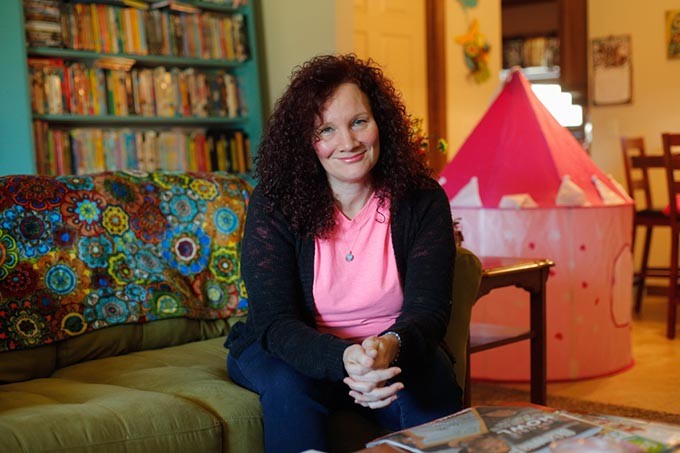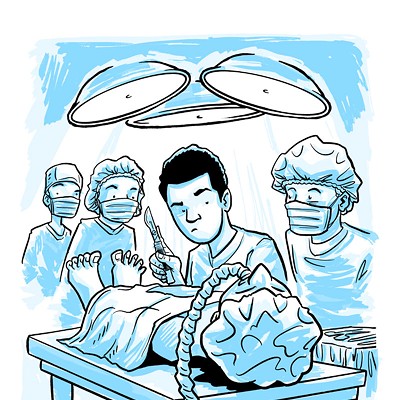Editor’s note: Local Impact is an Oklahoma Gazette news series examining how federal policies and decisions impact local communities.
When Angie Ward enrolled in the Affordable Care Act’s insurance marketplace in August, she planned to use her plan’s core benefits for routine health needs.
After a cycling wreck along a paved Lake Hefner trail two months later, Ward ended up in the emergency room as medical professionals listed needed tests and procedures.
As a mother and small business owner who also worked two other jobs to keep afloat, the possibility of missed work, lost income and mounting medical bills raced through her mind.
“My life changed that day,” Ward recalled. “I was in panic and was fearful, like anyone would be.”
Five months later, Ward had endured countless doctor visits and multiple surgeries to fix rotator cuff tears and a torn knee ligament. Statements from BlueCross BlueShield of Oklahoma, the only marketplace insurer in the state, show the Village resident doesn’t owe a penny.
Under the Affordable Care Act (ACA), also called Obamacare, Ward qualified for a subsidy that greatly reduced her monthly premiums and out-of-pocket costs. In the event of a catastrophe, like her cycling injuries, Ward’s insurance covered the costs of her care.
Ward said she is sure her ACA benefits, which she was required by law to have or face a penalty, kept her from bankruptcy or having to go without needed health care.
“Every day, I express how grateful I am,” Ward said. “Where would I be if I had no income and all of these medical bills?”
Her relief became nervousness as federal lawmakers and President Donald Trump’s administration promised to “repeal and replace” the ACA. While Ward admits that some aspects of the ACA should be reformed, she also describes herself as one of millions of Americans whose lives have improved under ACA mandates.
“It’s very disheartening and frustrating when all I hear on the TV from the mouths of politicians is that [the ACA] is falling apart and is a disaster,” Ward said. “My heart just drops because I am sitting here. I say out loud, ‘Look at me. Look at what it did for me.’”
ACA impact
It was easy for the public to overlook positive aspects of ACA as Capitol Hill politicians stirred health care debate for years and media centered on some people’s increased premiums and out-of-pocket costs.
Signed by President Barack Obama in 2010, the ACA was designed to reform the health care industry by adding consumer protections, regulations, subsidies, taxes, insurance exchanges and other reforms. The ACA affects both private and public health insurance.
“The biggest effect that the ACA has had has also been the easiest to overlook,” said Carly Putnam, an Oklahoma Policy Institute health care analyst. “It reformed what insurance companies can and can’t do.”
Well-known and popular ACA provisions required insurance providers to cover people with pre-existing conditions and dependents up to age 26. Other provisions also required insurers to cover 10 essential health benefits, including pregnancy, newborn care, mental health and substance abuse treatment, rehabilitation services, outpatient care and emergency services.
“All of that, I think, really changed the way we look and talk about health care coverage,” Putnam said. “I think that is one of the reasons we’ve seen the polling turn around on the ACA.”
Oklahoma has a unique ACA experience. State lawmakers declined to expand the Medicaid program or set up a state health-insurance exchange under the act.
At the end of open enrollment for 2016, 145,329 Oklahomans had enrolled in plans sold on HealthCare.gov since its start, according to Department of Health and Human Services data.
Since HealthCare.gov debuted, more Oklahomans are now insured. In October 2015, 15.43 percent of residents were uninsured, and 13.96 percent were without insurance a year later. Comparatively, 9 percent of Americans remain uninsured.
HealthCare.gov has failed to attract Oklahomans. Putnam said that’s due to a general misunderstanding of what the ACA does.
While premiums can be higher, most people qualify for tax credits and cost-sharing options that help keep costs low.
Rural view
When Amy Hancock talks about her experiences purchasing insurance through the health insurance exchange, fellow rural Oklahomans typically respond with surprise as she tells them her insurance and prescription costs are affordable.
“When you are on your own as a small business owner, you need affordable health care,” Hancock said. “That’s what the ACA has been for me. It is very helpful, and I pay about $67 a month for my health insurance.”
The former health care worker, who enjoyed years of good employer-sponsored health benefits, signed up for individual insurance in December.
In Carter County, where Hancock lives, Trump earned 74 percent of the presidential election vote. As a presidential candidate, he described the ACA as a “total disaster” and vowed to repeal and replace it. Hancock said her friends and neighbors are surprised when she praises the ACA.
“The political nature of Obamacare is statements that we need to replace it and it’s terrible,” Hancock said. “No, it’s not. I am a real-life person. It has really helped me. I will be in a rough spot if they repeal it because I have come to depend on the benefits.”
Health care fate
Last month, both Ward and Hancock made repeated calls to Oklahoma’s Congressional leaders to share their stories and encourage lawmakers to vote against the GOP’s ACA replacement plan. Called the American Health Care Act, the proposal affected the federal deficit and the number of insured Americans.
Many analysts believed the plan, which was pulled from consideration March 24, would most affect older people who do not qualify for Medicare yet.
The ACA remains law for now, but the debate is far from over as House Republican leaders, President Trump and his administration continue negotiations.
As Ward keeps a close watch on decisions from Capitol Hill, she focuses on healing from a recent knee surgery. She doesn’t want to postpone any medical treatments, as the fate of her health care — and many millions of others — might hang in the balance.
Print headline: Local impact, While the ACA survives, Oklahomans express worry about possible changes.












